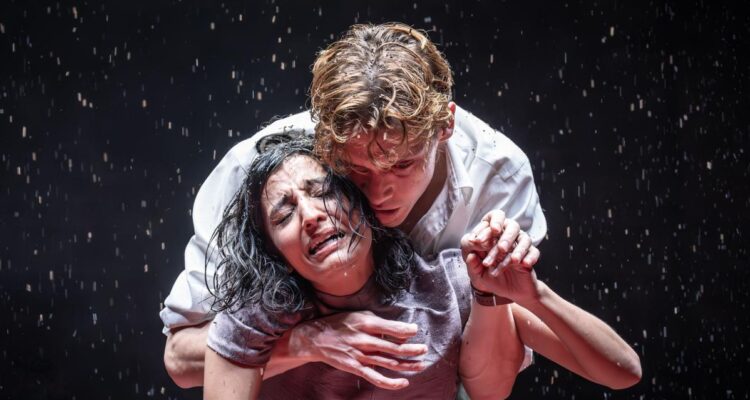In 1956, Look Back in Anger, John Osborne’s establishment-shaking play, premiered at the Royal Court. It was an event that single-handedly dismantled the drama of Edwardian drawing rooms in favour of the squalid shared digs of a sweet seller. With its ear to the ground, the play spoke in a recognisable voice, expressing youthful ire at society’s multiple failings—the corrosiveness of class divisions, the lack of opportunities for the newly educated, and the failure of sexual relationships. The Almeida’s revival, directed by Atri Banerjee, has set off a similar landmine.
Once a radical statement about class consciousness, this production recasts Osborne’s writing as pure misogynist diatribe. If Richard Burton’s Jimmy Porter is seductively Byronic—brooding, callous, tormented by a mysterious past—Billy Howle’s is a despicable domestic abuser, verbally lacerating his middle-class wife, Alison (a fragile Ellora Torchia) and revelling in her undoing. After one of his rants, he maliciously pushes the iron board and burns her. Instead of showing any remorse, he scarpers without apology and leaves their compassionate flatmate Cliff (brilliantly played by Iwan Davies) to tend to her wounds, a role he undertakes for the duration of the play.
While this ensemble cast were blistering in Roots, in Look Back in Anger they fail to come together in the same way. The character of Helena (Morfydd Clark), Alison’s Dior-clad friend, feels underdeveloped. She arrives in the flat-share to rescue Alison and her unborn baby, but it’s not soon before she, too, is in Jimmy’s bed and is put to work ironing his shirts. Problematically, there’s never any glint of Helena’s attraction to him, no overly long stares or flirtatious insults. She’s played as a proto-Pinteresque interloper in a way that feels completely untrue to Osborne’s gritty realism.
Similarly, Jimmy and Alison lack chemistry. Their attempts at sexual roleplay are cold and desperate, nothing like the tough, animalistic eroticism of Rebecca Frecknall’s 2023 A Streetcar Named Desire, which Imogen Knight (movement director) seemed to be referencing. And it’s this blazing attraction that sustains the narrative—and their otherwise empty lives. For while Jimmy resents Alison’s class respectability, their mutual sexual desire is what holds them together. Love and hate are toxically entangled. Without keeping this in mind, it’s hard to understand why at the play’s close they are seen once more embracing.
Worthy of commendation is Naomi Dawson’s immersive set, one that literalises Alison’s reflection that everything about Jimmy ‘seemed to burn’. Audience attention is drawn to smoking irons, sizzling cigarettes and old-fashioned cigars. Smoke trails are drawn in the air, underscoring the rage that suffocatingly engulfs their domestic lives. Moreover, a circular hole opens in the centre of the stage while Jimmy symbolically peers over, looking into the heart of an immense darkness.
Look Back in Anger has retained its inflammatory power to divide—at the curtain call, there were enthusiastic cheers and sighs of relief. This is a production that excavates the misogyny from this play, but also regrettably falls prey to it, casting Osborne’s women—who express powerful sexual desire, who leave bad relationships—as unpalatably passive. Nevertheless, there are brilliant moments where Osborne’s dialogue flares into poetry through Howle and Torchia, and you feel the pain of characters robbed of the lives they thought they should have had. The Almeida’s ‘Angry and Young’ season successfully contests that Look Back in Anger remains a masterpiece and that Alison’s probing words burn as brightly in 2024: ‘Something’s gone wrong, hasn’t it?’
Drama
By John Osborne
Director: Atri Banerjee
Cast includes: Billy Howle; Ellora Torchia; Iwan Davies; Morfydd Clark; Deka Walmsley.
Until: Saturday 23rd November 2024
Running Time: 2 hour and 45 minutes
Photo credits: Marc Brenner

